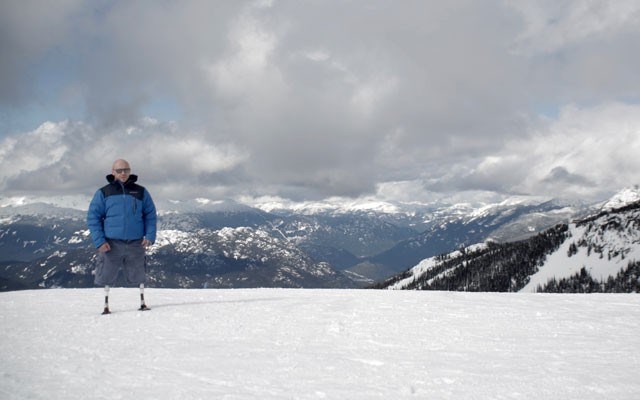Micky Yule was always one to push the envelope before connecting with U.K.-based Betty TV.
The 38-year-old Scotsman lost his legs above the knee in 2010 after stepping on an improvised explosive device while serving as a Royal Engineer in Afghanistan. Yule got back into power-lifting as part of his rehabilitation, eventually representing Scotland at the Commonwealth Games in 2014 and Team GB at the Paralympics and Invictus Games in 2016, winning gold at the latter.
Not satisfied, however, Yule accepted an offer to learn skeleton. In his first official race, this Friday, April 7 at Whistler Sliding Centre, he'll go head-to-head with five-time men's world champion Martins Dukurs of Latvia. The public is encouraged to come watch the race beginning at 5 p.m.
"It's been a really big learning curve with everything I've had to take on," Yule said in an April 3 interview. "We've got two more days to try to nail down some technique."
The race will be featured as the culmination of a documentary, set to screen next year, following Yule's effort to learn the sport and challenge its top able-bodied athlete.
"There was this new initiative, TV program starting up trying to break down barriers between disabled athletes and able-bodied athletes, changing perceptions of what guys with disabilities can do," Yule said.
Being an adaptive athlete provides its share of challenges in sports where there is precedent for participation, and going into uncharted waters was a major appeal for Yule, though it's been difficult.
"Skeleton is a sport that hasn't had any Paralympic representation and one of the reasons is it's really dangerous and just hasn't been taken on by a disabled athlete," he said. "We've had to really deal with all those problems. We're the first people that have taken these steps on and we've had to meet all the challenges every other sport has had."
One of those has been getting the proper prosthetics so that Yule can effectively distribute his weight over the sled — with the additional challenge of having a significant heft from his power-lifting prowess. Yule also noted how the able-bodied athletes can use their feet, spotting Dukurs an advantage.
"A lot of the skeleton athletes, the able-bodied guys, will use their legs and use toe taps to help them down the ice, which I have not got," he said. "A lot of it has to do with the balance — I'm a really top-heavy guy, so all my power and muscle is up high in my upper body. Unfortunately, my lower stumps are small, so the balance on the sled has been a big, big problem and so it's a constant puzzle we've got to solve with that one."
However, Yule said it seems like after plenty of trial and error, he and his team have found the right balance with both his legs and his sled so that he'll be competitive come race day.
"We went away as a team and worked so, so hard before coming here in the build-up to this. Now we're at Whistler and the sled is working beautifully," he said.
In addition to the challenges associated with taking on the sport as an adaptive athlete, there are also the ingrained habits from power-lifting that Yule has tried to shake off.
"I had to change all my training. I'm all about strength and power and skeleton is mostly finesse and being cute on the ice, being all flexible," he said. "One of my main problems was I was trying to muscle the sled through a lot of stuff. I had to forget my training and learn all the new techniques.
"You're getting up to 116 km/h and you're hitting five Gs in the corners and your body just takes a battering the whole way down. (Even with) my neck, which I like to think is really strong, sometimes I feel like my head's going to come bouncing down the track before I do."
Yule credited a multitude of coaches and instructors for helping him properly acclimatize to the new, icy venue and setting him up for success.
"I'm the last cog in this big chain and I certainly don't want to let everybody down, so the pressure's on," he said.
The first time Yule went down the track was earlier in 2017 when he trained at the Innsbruck track in Austria. After learning of Whistler's reputation as the quickest track in the world, true to form, Yule knew exactly where he wanted to challenge Dukurs.
"The track is a beast. I was in Austria, in Innsbruck, doing a little bit of training there and everyone I spoke to said 'Don't go to Whistler. It will be too fast, it'll be too dangerous for an amputee,'" he said. "I just thought 'You know what, I've heard that all my life when people tell me I can't do stuff.'"
With an intriguing battle shaping up at the sliding centre on Friday night, Yule hopes to see a good crowd to take in the race.
"(Dukurs is) at the top of the tree of skeleton and I'm going to try to take him on. I'll need every ounce of support I can get on Friday," he said. "The guy who won the 100m in the Rio Paralympics, he can't beat Usain Bolt. That's what we're trying to do. We're taking on the Usain Bolt of skeleton after three weeks of training.
"We're going to try to create history."




